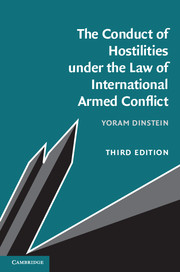Book contents
- Frontmatter
- Contents
- Introduction to the Third Edition
- Preface
- Table of cases
- Table of treaties
- List of abbreviations
- 1 The general framework
- 2 Lawful combatancy
- 3 Prohibited weapons
- 4 Lawful targets of attack
- 5 Protection from attack of civilians and civilian objects
- 6 Measures of special protection from attack
- 7 Protection of the environment
- 8 Specific methods of warfare
- 9 War crimes, orders, command responsibility and defences
- General conclusions
- Index of persons
- Index of subjects
7 - Protection of the environment
Published online by Cambridge University Press: 05 April 2016
- Frontmatter
- Contents
- Introduction to the Third Edition
- Preface
- Table of cases
- Table of treaties
- List of abbreviations
- 1 The general framework
- 2 Lawful combatancy
- 3 Prohibited weapons
- 4 Lawful targets of attack
- 5 Protection from attack of civilians and civilian objects
- 6 Measures of special protection from attack
- 7 Protection of the environment
- 8 Specific methods of warfare
- 9 War crimes, orders, command responsibility and defences
- General conclusions
- Index of persons
- Index of subjects
Summary
Customary international law
619. The importance of the environment is universally acknowledged. As the ICJ articulated the idea in its Advisory Opinion on Nuclear Weapons:
the environment is not an abstraction but represents the living space, the quality of life and the very health of human beings, including generations unborn.
Attacks in wartime against military objectives (as defined supra 275) often jolt the environment. The prime example is an attack against oil facilities (on their nature as military objectives, see supra 330). An air strike against an oil refinery may give rise to toxic air pollution. When an oil storage facility is demolished, the oil may seep into the ground and poison water resources. When an oil tanker is sunk at sea, the resultant oil spill may be devastating to marine life.
620. The Advisory Opinion on Nuclear Weapons went on to say:
States must take environmental considerations into account when assessing what is necessary and proportionate in the pursuit of legitimate military objectives. Respect for the environment is one of the elements that go to assessing whether an action is in conformity with the principles of necessity and proportionality.
The principle of proportionality has been discussed supra 408 et seq. It follows from the Court's dictum that, in keeping with the principle of proportionality, ‘an attack on a military objective must be desisted from if the effect on the environment outweighs the value of the military objective’.
621. The legal position under present-day customary LOIAC is that, when any attack is launched, ‘due regard’ must be given to the protection of the environment. Since, broadly speaking, the environment as such is a civilian object (see infra 641), even if an attack is planned in an area with little or no civilian population, it may have to be abandoned should the harm to the environment be expected to be ‘excessive’ in relation to the military advantage anticipated (see supra 408). Conversely, (i) it is very difficult to measure on a purely speculative basis the expected damage to the environment from a conventional attack; and, anyhow, (ii) ‘if the target is sufficiently important, a greater degree of risk to the environment may be justified’.
- Type
- Chapter
- Information
- Publisher: Cambridge University PressPrint publication year: 2016



